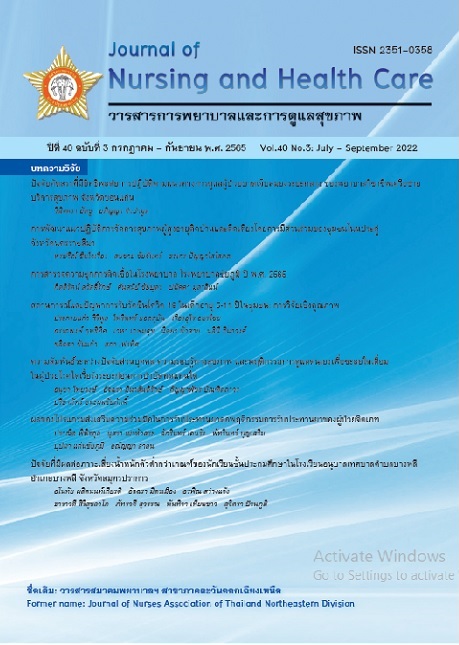ความสัมพันธ์ระหว่างปัจจัยส่วนบุคคล ความรอบรู้ทางสุขภาพ และพฤติกรรมการดูแลตนเอง เพื่อชะลอไตเสื่อมในผู้ป่วยโรคไตเรื้อรังระยะก่อนการบำบัดทดแทนไต
คำสำคัญ:
โรคไตเรื้อรัง, ความรอบรู้ทางสุขภาพบทคัดย่อ
การวิจัยนี้เป็นการวิจัยแบบภาคตัดขวางเพื่อศึกษาความสัมพันธ์ระหว่างปัจจัยส่วนบุคคล ความรอบรู้ทางสุขภาพกับพฤติกรรมการดูแลตนเองเพื่อชะลอไตเสื่อมในผู้ป่วยโรคไตเรื้อรังระยะก่อนการบำบัดทดแทนไต กลุ่มตัวอย่างเป็นผู้ป่วยโรคไตเรื้อรังระยะก่อนการบำบัดทดแทนไต ในพื้นที่ชุมชนเมืองแห่งหนึ่งในจังหวัดมหาสารคาม คัดเลือกกลุ่มตัวอย่างด้วยการสุ่มแบบหลายขั้นตอน จำนวน 74 ราย เก็บรวบรวมข้อมูลโดยใช้ 1) แบบบันทึกข้อมูลทั่วไปส่วนบุคคล 2) แบบวัดความรอบรู้ทางสุขภาพ และ 3) แบบวัดพฤติกรรมการดูแลตนเองเพื่อชะลอไตเสื่อม ดำเนินการวิจัยระหว่างเดือนกันยายน พ.ศ. 2561 ถึงเดือนกุมภาพันธ์ พ.ศ. 2562 วิเคราะห์ข้อมูลด้วยสถิติเชิงพรรณนา สถิติทดสอบไคน์สแคว์ และสถิติสหสัมพันธ์ของเพียร์สัน
ผลการวิจัย พบว่ากลุ่มตัวอย่างมีความความรอบรู้ทางสุขภาพ (Mean = 43.78 ± 5.63) และพฤติกรรมการดูแลตนเองเพื่อชะลอไตเสื่อม (Mean = 92.11 ± 1.59) อยู่ในระดับปานกลาง และพบว่าความรอบรู้ทางสุขภาพมีความสัมพันธ์ทางบวกกับพฤติกรรมการดูแลตนเองเพื่อชะลอไตเสื่อมอย่างมีนัยสำคัญทางสถิติที่ระดับ .05 (r = .348; p <.05) ผลการศึกษานี้ใช้เป็นข้อมูลพื้นฐานในการเลือกให้ข้อมูลทางสุขภาพตามระดับความรอบรู้ทางสุขภาพในผู้ป่วยโรคไตเรื้อรัง อันจะก่อให้เกิดพฤติกรรมการดูแลตนเองที่ถูกต้องและเหมาะสม และช่วยชะลอการลุกลามของโรคในผู้ป่วยกลุ่มนี้ได้
Downloads
เอกสารอ้างอิง
Hill NR, Fatoba ST, Oke JL, Hirst JA, O’Callaghan CA, Lasserson DS, et al. Global prevalence of chronic kidney disease–a systematic review and meta-analysis. PloS one 2016; 11(7): 1-18.
Mills KT, Xu Y, Zhang W, Bundy JD, Chen C-S, Kelly TN, et al. A systematic analysis of worldwide population-based data on the global burden of chronic kidney disease in 2010. Kidney Int 2015; 88(5): 950-7.
Jitraknatee J, Ruengorn C, Nochaiwong S. Prevalence and risk factors of chronic kidney disease among type 2 diabetes patients: A cross-sectional study in primary care practice. Sci Rep 2020; 10(1): 1-10.
Futrakul N, Futrakul P. Vascular homeostasis and angiogenesis determine therapeutic effectiveness in type 2 diabetes. Int J Vasc Med 2011; 2011: 971524.
National Kidney Foundation. KDOQI clinical practice guideline for diabetes and CKD: 2012 update. Am J Kidney Dis 2012; 60(5): 850-86.
Ingsathit A, Thakkinstian A, Chaiprasert A, Sangthawan P, Gojaseni P, Kiattisunthorn K, et al. Prevalence and risk factors of chronic kidney disease in the Thai adult population: Thai SEEK study. Nephrol Dial Transplant 2010; 25(5):1567-75.
Cheung AK, Chang TI, Cushman WC, Furth SL, Hou FF, Ix JH, et al. KDIGO 2021 clinical practice guideline for the management of blood pressure in chronic kidney disease. Kidney Int 2021; 99(3): S1-S87.
de Boer IH, Caramori ML, Chan JC, Heerspink HJ, Hurst C, Khunti K, et al. Executive summary of the 2020 KDIGO Diabetes Management in CKD Guideline: Evidence-based advances in monitoring and treatment. Kidney int 2020; 98(4): 839-48.
Futrakul N, Futrakul P. A mildly altered vascular homeostasis in early stage of CKD. Ren Fail 2009; 31(7): 538-43.
Arora P, Jalal K, Gupta A, Carter RL, Lohr JW. Progression of kidney disease in elderly stage 3 and 4 chronic kidney disease patients. Int Urol Nephrol 2017; 49(6): 1033-40.
Dai D, Alvarez PJ, Woods SD. A predictive model for progression of chronic kidney disease to kidney failure using a large administrative claims database. Clinicoecon Outcomes Res 2021; 13: 475-86.
Yu P-S, Tsai Y-C, Chiu Y-W, Hsiao P-N, Lin M-Y, Chen T-H, et al. The relationship between subtypes of health literacy and self-care behavior in chronic kidney disease. J Pers Med 2021; 11(6): 447-57.
Janthapuek J, Chopsiang L. Relationships between health literacy and self-care behaviors to delay the progression of chronic kidney disease among patients with chronic kidney disease stages 1 and 2. Regional Health Promotion Center 9 Journal 2020; 14(34): 243-58. (in Thai).
Bunklai K, Kanoksuntonrat N, Phinitkhonjorndech N. Relationship between health literacy, self care behaviors, and glomerular filtration rate among patients with chronic kidney disease stage 3-4. Boromarajonani College of Nursing, Uttaradit Journal 2020; 12(1): 225-39. (in Thai)
Vorrapittayaporn C, Malathum P, Phinitkhajorndech N. Relationships among knowledge, health literacy, and health behavior in older persons with chronic kidney disease. Rama Nurs 2021; 27(1): 81-95. (in Thai).
Tsai Y-C, Wang S-L, Tsai H-J, Chen T-H, Kung L-F, Hsiao P-N, et al. The interaction between self-care behavior and disease knowledge on the decline in renal function in chronic kidney disease. Sci Rep 2021; 11(1): 1-9.
Evangelidis N, Craig J, Bauman A, Manera K, Saglimbene V, Tong A. Lifestyle behaviour change for preventing the progression of chronic kidney disease: a systematic review. BMJ Open 2019; 9(10): 1-15.
Schrauben SJ, Apple BJ, Chang AR. Modifiable Lifestyle Behaviors and Chronic Kidney Disease Progression: A Narrative Review. Kidney 360 2022; 3(4): 752-78.
Kaeodumkoeng K, Thummakul D. Health literacy promoting in aging population. Journal of Health Science Research 2015; 9(2): 1-8. (in Thai).
van der Heide I, Poureslami I, Mitic W, Shum J, Rootman I, FitzGerald JM. Health literacy in chronic disease management: a matter of interaction. J Clin Epidemiol 2018; 102: 134-8.
Nutbeam D. The evolving concept of health literacy. Soc Sci Med 2008; 67(12): 2072-8.
Devraj R, Borrego M, Vilay AM, Gordon EJ, Pailden J, Horowitz B. Relationship between health literacy and kidney function. Nephrol 2015; 20(5): 360-7.
Ginggeaw S, Prasertsri N. The relationship between health literacy and health behaviors among older adults who have multi-morbidity. Nursing Journal of the Ministry of Public Health 2016; 45(3): 43-54. (in Thai)
Rattanawarang W, Chantha W. Health literacy of self-care behaviors for blood glucose control in patients with type 2 diabetes, Chainat province. The Journal of Baromarajonani College of Nursing, Nakhonratchasima 2018; 24(2): 34-51. (in Thai).
Hongkrajok H, Pathumarak N, Masingboon K. Influences of health literacy, perceived self-efficacy, and patient-health care provider communicationon self-care behaviors among patients with primary hypertension. Royal Thai Navy Medical Journal 2016; 43(2): 39-54. (in Thai).
Wong KK, Velasquez A, Powe NR, Tuot DS. Association between health literacy and self-care behaviors among patients with chronic kidney disease. BMC nephrol 2018; 19(1): 1-8.
Weinstein JR, Anderson S. The aging kidney: physiological changes. Adv. Chronic Kidney Dis 2010; 17(4): 302-7.
Taiwong A, Kanoksoonthornrut N, Chaiviboonthum S. Relationship between unpleasant symptom clusters and quality of life among patients with chronic kidney disease. Journal of Nursing Health Care 2017; 35(3): 120-8. (in Thai).
ดาวน์โหลด
เผยแพร่แล้ว
รูปแบบการอ้างอิง
ฉบับ
ประเภทบทความ
สัญญาอนุญาต
ลิขสิทธิ์ (c) 2022 วารสารการพยาบาลและการดูแลสุขภาพ

อนุญาตภายใต้เงื่อนไข Creative Commons Attribution-NonCommercial-NoDerivatives 4.0 International License.



